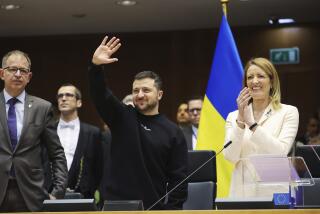Yeltsin Claims 2 More Republics Want to Join Alliance : Commonwealth: But leaders of Armenia and Kyrgyzstan, as well as Kazakhstan, deny final decisions have been made.
- Share via
MOSCOW — Russian Federation President Boris N. Yeltsin said Wednesday that two more republics, Armenia and Kyrgyzstan, have decided to join the Commonwealth of Independent States, increasing chances that the alliance formed over the weekend by Slavic leaders will attract most of the Soviet republics.
The leader of Kazakhstan, the most important republic that has not yet signed up with the alliance, said his republic “seriously intends to join the new commonwealth” after some articles are added to the agreement, according to Gennady E. Burbulis, the Russian Federation’s secretary of state.
But top officials in the republics of Kazakhstan, Armenia and Kyrgyzstan (formerly Kirghizia) denied that their governments had made decisions on joining the new bloc. They confirmed, however, that they support the idea of a loose economic and strategic community of independent states.
Asked by reporters which republics have agreed to join to new alliance, Yeltsin replied: “Armenia and Kyrgyzstan said it flatly. As regards Kazakhstan, Tadzhikistan, Turkmenistan and probably Azerbaijan, they will decide the question tomorrow.”
The leaders of those four republics and Kyrgyzstan, whose populations are all predominantly Muslim, are expected to meet to discuss the issue today in Ashkhabad, the capital of Turkmenistan. Yeltsin said he would travel on Saturday to Alma Ata, capital of Kazakhstan, to sign agreements with these republics if they decided to join.
But according to officials in the republics, Yeltsin and his men have been so eager to show how widespread the support for the commonwealth has grown that they have jumped the gun in announcing new members.
After Yeltsin announced Armenia’s intention to join in the commonwealth, Armenian Foreign Minister Raffi K. Hovannisian said: “We are examining the question, but there is no decision yet. I spoke to the president about it an hour ago, so I’m absolutely sure of this.”
In Kyrgyzstan, Meditkham Sherimkulov, the chairman of the legislature, said the legislative session had opened Wednesday to inaugurate President-elect Askar Akayev. In his speech, Akayev expressed his positive attitude toward the commonwealth but bowed to lawmakers to decide whether the republic will join. Lawmakers will start discussing the issue today.
“Consequently, no decision has been made on whether to join or not to join,” Sherimkulov said.
Irina Konovalova, adviser to Kazakhstan President Nursultan Nazarbayev, was equally firm in denying Burbulis’ statement that Kazakhstan had decided to join the alliance. She said that in a conversation she had with Nazarbayev Wednesday, he said: “There are no agreements achieved between us; so far, we have had only consultations and negotiations.”
She said Burbulis had pressed Nazarbayev for an opinion on the commonwealth, and he had said that in principle he likes it. But Burbulis then went out and said Nazarbayev was in the alliance. Nazarbayev’s adviser said the topic will be discussed by leaders of the Islamic republics during a meeting today in Ashkhabad.
News of this Islamic summit was greeted cautiously by those in the West who fear that the crumbling Soviet Union will be split into two camps, one Christian and one Muslim. But Yeltsin said he expects the leaders of the Islamic republics to agree to join the commonwealth; Nazarbayev’s adviser confirmed that the commonwealth would be the only topic of conversation.
“There is no reason to worry about an Islamic union,” Konovalova said. “Nazarbayev said he is categorically against any creation of any entities based on national or religious grounds.” She conceded, however, that “there are tendencies in other Islamic republics to form an Islamic union, but its exclusive purpose will be economic integration.”
News of the Islamic summit was greeted calmly even in mostly Christian Armenia, which has the most reason to fear an Islamic union because it has been caught up in ethnic clashes for three years with the neighboring republic of Azerbaijan, whose population is mostly Muslim.
“Armenia is not threatened by it,” Foreign Minister Hovannisian said of an Islamic union. “I think that concept is something of the past. We are certain that, if there were an Islamic union, it would be only an economic union. But it would be our preference to have an economic union of all the former Soviet republics.”
Discussing the pact is also on today’s agenda of the Russian Federation legislature, starting with a speech from Yeltsin. The legislatures of Ukraine and Belarus ratified the agreement Tuesday. The agreement appears likely to be approved by the Russian legislature as well.
Yeltsin met Wednesday with leaders of the parties and factions in the legislature and all but one--Sergei Baburin, leader of the Rossiya faction, which represents only a few dozen of the lawmakers--supported the commonwealth, according to “TV Inform,” the central television news program.
More to Read
Sign up for Essential California
The most important California stories and recommendations in your inbox every morning.
You may occasionally receive promotional content from the Los Angeles Times.










